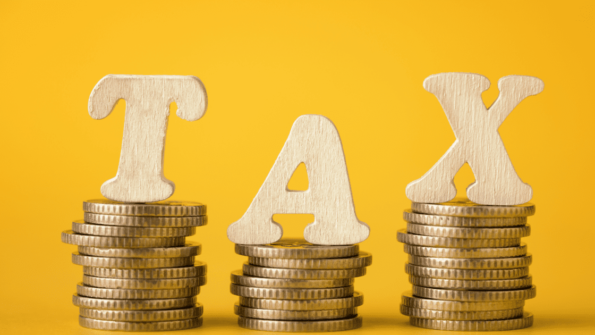In Canada, all dividends are taxed. The good news is that if you receive dividends in Canada, you are eligible for the Dividends Tax Credit. The important thing to know is that as of 2021, you’ll have to pay taxes when your eligible dividends reach $63,040 CAD. That’s not all, though.
In this piece, we’ll review how dividends are taxed in Canada.
Stocks are a popular form of investment, and if you know how to use stocks to your advantage, they can be a great investment. But for those who are newer to stocks, there is a lot of terminology and information to take in.
Let’s start by discussing one commonly used term in the stock market – “dividends.” More specifically, let’s look at what dividends are and how they are taxed in Canada.
What are Dividends?
When investors invest in stocks, they do so in the hopes of eventually turning a profit. This profit is rewarded when the company they have invested in earns its own profits. When a company shares its profits with its shareholders, these are called “dividends.”
A Board of Directors determines dividend payouts. They are most commonly paid out quarterly but may also be paid annually or semi-annually. Dividends can be paid in the form of stocks or in cash. In some cases, they may also be distributed as another form of property.
Shareholders vote upon dividends through their voting rights. When paid out, the money originates from the company’s net profits.
While the majority of these profits are maintained by the company themselves and re-used for future business activities, the remainder is divided appropriately among investors or shareholders.
There may be some cases where dividends are paid out even when no profit has been made.
Why do People Invest in Dividend Stocks?
There are several reasons one may choose to invest in stocks that pay dividends. Most commonly, investors seek out dividend stocks as an extra source of income.
Dividends are never guaranteed, but companies that pay out dividends regularly are considered likely to do so in the future, making them an attractive option to investors who want to bring in some extra money.
In this sense, dividend stocks allow you to get paid twice – when the dividend is paid out and when you sell your stock.
Dividend stocks can also be an attractive option for extra income because they are taxed at lower rates than the standard. We will discuss this in further detail as we continue throughout the article.
Some terms you should know
If you are looking to earn dividends from your stocks, there are some important terms you should know first. More specifically, there are specific “date” terminologies you should be familiar with:
Announcement Dates: The announcement date is when the company announces the dividends. This can sometimes be referred to as the declaration date. Before the dividends can be divided, they must be approved by the shareholders.
Ex-Dividend Date: This is the date by which a shareholder must purchase their stocks to receive dividends. Anything purchased after this date will not qualify for dividends.
For example, if an ex-dividend date is August 5, you must purchase shares before this date to qualify for dividends. If you purchase on August 6, you will not qualify.
Record Date: This is the date by which the company determines which shareholders can receive dividends.
Payment date: As you have probably already guessed, this is the payout date by which eligible shareholders receive their dividends.
Why Do Companies Pay Dividends?
When a company earns a profit, that company has two options – reinvest that money back into the company, or pay out dividends to its investors. The logical choice says to reinvest the profits back into the company.
If you have that option, why wouldn’t you? But there are actually several different reasons that a company may choose to pay dividends instead.
When a company has enough profit coming in, paying dividends to its shareholders can increase the stock appeal of the company. This can keep current investors interested in the company and can help to attract new investors as well.
It can also help to portray the company in a positive light. Dividends showcase a “you help us, and we’ll help you” attitude, making the company a more attractive option for future investors.
Dividends also tell investors that a company is doing well and that its stocks are worth investing in. Companies that do well but don’t provide dividends to their investors are often considered suspicious in the stock market.
How are Dividends Paid Out?
There are four different types of dividend payments:
- Cash
- Stock
- Property
- One-time
As you have probably already suspected, cash dividends are paid out in cash. Most companies pay cash dividends based on an amount per share. For example, a company may pay out $10 per share every quarter.
That means someone who owns 100 shares would receive a dividend payout of $1000 every 3 months. This money is taxed, which we will talk about a little more later in the article.
When a company pays out dividends in stocks, they are still taxed, but not until those stocks are sold. That puts more power into the hands of the investor, who can then choose when to sell and tax the stocks. Like cash dividends, stock dividends are also paid out based on the number of shares you own.
For example, a company may pay a 10% stock dividend. In such a case, someone with 100 shares will now be given 110. This alternative works well for companies that don’t have the extra cash flow to pay out cash dividends or who want to put that cash back into the business.
A less common option of dividend payments is property dividends. In some cases, companies may pay dividends in the form of physical assets.
This can include anything from a piece of real estate, a piece of land, tools, or equipment. Again, this option may be used if a company does not have the extra cash flow or does not wish to distribute its extra cash or stocks.
Finally, we have one-time dividend payments. These are often given out when a company makes a large sale or has some other type of large success. These dividends can be given as an addition to regular dividends.
How are Dividends Taxed in Canada?
In Canada, all dividends are taxed. The good news is if you receive dividends in Canada, you are eligible for the Dividends Tax Credit. All dividends will be taxed lower than any interest or employment income. This is part of the draw of dividends to investors.
The exact tax rate of your dividends will depend on your tax bracket.
There are two different tax credits for dividends; federal dividends tax credits and provincial dividends tax credits. Federal tax credits are the same throughout Canada, while provincial credits will differ from province to province.
Taxable income for dividends can reach up to 138%. This means that 100% of your dividend is eligible for tax credits. An additional 38%, referred to as a “gross-up,” represents the income tax that has been paid by the corporation based on its income.
In conclusion, dividend stocks can be a great investment. Not only do they provide a payout in the form of dividends, but you can also make money when you sell your stock.
If you are looking at investing in dividend stocks, it’s a good idea to speak with a financial advisor to learn more about the ins and outs of investing.












